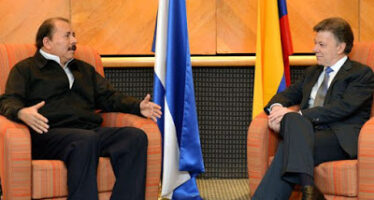Hugo Chávez tells Venezuelans to drink juice not Coke
![]()
President urges people to buy state-made Uvita to boost consumption of homegrown products and reduce imports
Associated Press in Caracas
Hugo Chávez at a campaign rally in Maracaibo. He has refused to stop using the airwaves for his special broadcasts despite complaints from rivals. Photograph: Comando De Campana Carabobo/AFP/Getty Images
President Hugo Chávez has urged Venezuelans to drink fruit juice produced by a state-run company rather than Coca-Cola or Pepsi.
He says people should buy Uvita, a grape juice made by Corpozulia as a means of increasing the consumption of Venezuelan-made products instead of buying sugary sodas made by foreign companies.
Chávez often dispenses advice to supporters during his marathon televised speeches, calling on them to eat healthy foods, exercise and avoid drugs and alcohol.
During Sunday’s speech, he said Venezuela was trying to boost consumption of domestic goods as a means of reducing imports. Chávez is also promoting a Venezuelan wine. The South American nation imports most of the food and drinks Venezuelans consume.
The president also vowed not to stop using the country’s airwaves for his addresses, despite complaints from his challenger that it gives him an unfair advantage during the election campaign.
Opposition candidate Henrique Capriles has demanded that election officials prevent Chávez from taking political advantage of the special broadcasts, which all networks are required by law to air, before Venezuela’s election on 7 October.
Directors of the National Electoral Council have approved campaign regulations that prohibit TV and radio messages that favour a presidential candidate to run longer than three minutes. But it is unclear whether the president’s frequent and lengthy special broadcasts, known as “cadenas”, will be affected.
“The cadenas are part of the national government’s information strategy,” said Chávez, speaking during one of the special broadcasts. “The bourgeoisie wants me to give up something that’s the faculty of the president of the republic. I’m not going to do it.”
Chávez, a former paratroop commander, argued that most of Venezuela’s privately owned TV channels, radio stations and newspapers are biased in favour of Capriles and he accused the independent media of ignoring his government’s achievements. “The major part of the radios, television channels and newspapers are in the hands of the bourgeoisie,” said Chávez, who is seeking re-election to a fresh six-year term.
When Chávez took office in 1999, he referred to four major TV channels – RCTV, Venevision, Globovision and Televen – as the “four horsemen of the apocalypse”. He accused the channels supporting a short-lived 2002 coup by broadcasting cartoons and films instead of the protests that aided his return to power.
Related Articles
The question of representation
![]()
It is time that public subsidies to the media are made subject to meaningful public oversight and control The opinion
Nicaragua / Colombia: Colombia presenta contramemoria a la Corte Internacional de Justicia
![]()
Como se recordará, Nicaragua en el 2001 presentó una demanda contra Colombia en materia de delimitación marítima en el Caribe, la cual fue objeto de un fallo, dictaminado en La Haya en noviembre del 2012
Turkey and Israel Reconcile Amid PKK Peace Promise
![]()
Palestinians walk past a statue erected as a memorial for the victims of the Turkish flotilla Mavi Marmara in



